
Former President Donald Trump’s recent statement about reclaiming control of the Panama Canal has sparked a diplomatic confrontation with Panama’s leadership.
At a Glance
- Trump threatens to retake control of the Panama Canal, citing unfair charges and Chinese influence
- Panama’s President José Raúl Mulino firmly rejects Trump’s claims, asserting Panama’s sovereignty
- The U.S. is the largest user of the canal, with over 70% of transits related to U.S. ports
- Legal experts doubt the feasibility of the U.S. reclaiming control under existing treaties
- The canal has been under Panamanian control since 1999, following the Torrijos-Carter Treaties
Trump’s Bold Claims at AmericaFest
During a rally at Turning Point USA’s AmericaFest in Arizona, former President Donald Trump made headlines by threatening to retake control of the Panama Canal. Trump criticized the current management of the canal, alleging unfair treatment of U.S. interests and suggesting Chinese influence as a concern.
Trump’s remarks have reignited discussions about the strategic importance of the Panama Canal in global trade dynamics. The former president’s stance reflects a broader narrative of reasserting American interests globally, a theme that resonates with his conservative base.
Donald Trump suggests Panama Canal be returned to US control https://t.co/X1JCNTTkox
— The Hill (@thehill) December 23, 2024
Panama’s Firm Response
In response to Trump’s statements, Panamanian President José Raúl Mulino issued a strong rebuke, emphasizing Panama’s sovereignty over the canal. This diplomatic clash underscores the sensitive nature of international agreements and the complexities of global trade infrastructure.
“As president, I want to clearly state that every square meter of the Panama Canal and its adjoining zone is Panama’s and will remain so. The sovereignty and independence of our country is non-negotiable.” – José Raúl Mulino
Mulino’s statement reflects a broader sentiment among Panamanians, who view the canal as a symbol of national pride and sovereignty. The canal, administered by the Panama Canal Authority, an independent government agency, has been under Panamanian control since 1999, following the implementation of the Torrijos-Carter Treaties.
Historical Context and Current Operations
The Panama Canal, originally built by the United States from 1904 to 1914, has a rich history intertwined with American engineering prowess and geopolitical strategy. The canal’s transfer to Panamanian control was a significant milestone in the country’s sovereignty and marked a shift away from U.S. influence in the region.
“We’re being ripped off at the Panama Canal like we’re being ripped off everywhere else.” – Donald Trump
Despite Trump’s claims of unfair treatment, the United States remains the largest user of the canal, with over 70% of transits related to U.S. ports. This statistic underscores the continued importance of the canal to American trade interests, even under Panamanian management.
Legal and Diplomatic Hurdles
Trump’s proposal to retake control of the Panama Canal faces significant legal and diplomatic challenges. The Torrijos-Carter Treaties, which facilitated the transfer of the canal to Panama, do not provide a clear legal pathway for the United States to reclaim control. Analysts and legal experts have expressed skepticism about the feasibility of such a move under existing international agreements.
“If the principles, both moral and legal, of this magnanimous gesture of giving are not followed, then we will demand that the Panama Canal be returned to the United States of America in full, quickly and without question. We’re not going to stand for it. So to the officials of Panama, please be guided accordingly.” – Donald Trump
Trump’s strategy, as outlined in his statements, involves a combination of legal arguments, negotiation tactics, and geopolitical maneuvering. However, the international community’s reaction to such a proposal remains to be seen, and any attempt to alter the current status of the canal would likely face significant opposition from Panama and its allies.
The Panama Canal is a great creation of the Panamanian people, and China has always supported their just struggle to maintain sovereignty over the canal, Chinese FM spokesperson Mao Ning said on Mon, commenting on US President-elect Donald Trump's claim that the canal is “an… pic.twitter.com/8c76CGjQnV
— Global Times (@globaltimesnews) December 23, 2024
Implications for Global Trade
The Panama Canal continues to play a crucial role in global trade, facilitating the passage of ships between the Atlantic and Pacific Oceans. Recent modernization efforts under Panamanian management have aimed to maintain the canal’s relevance in the face of evolving shipping technologies and trade patterns.
While Trump’s comments have stirred controversy, they also highlight the ongoing strategic importance of the Panama Canal in international commerce and geopolitics. As global trade dynamics continue to evolve, the management and operation of this vital waterway will likely remain a topic of international interest and debate.
Sources:
- Panama’s president and Trump spar over Panama Canal
- Trump Threatens to Take Control of Panama Canal, Greenland
- President Trump AGAIN Puts Panama’s President On Notice That We’re Taking Back The Panama Canal!
- Trump threatens to try to take back the Panama Canal. Panama’s president balks at the suggestion






